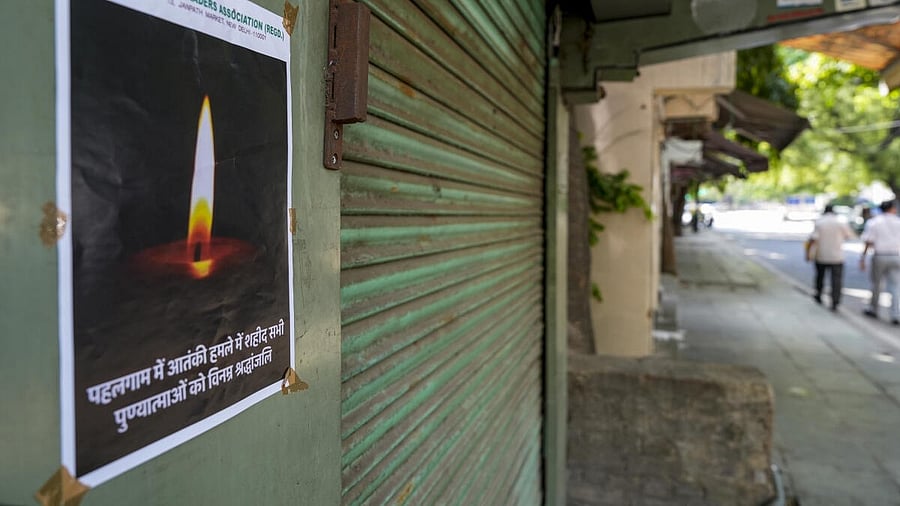
Protest against Pahalgam terror attack
Credit: PTI Photo
Srinagar: On April 22, as blood spilled over the serene meadows of Pahalgam, the ripples of terror reached far beyond the valleys and hills of Kashmir.
Hundreds of miles away, in hostel rooms, rented apartments, and factory dormitories across the country, the phones of Kashmiri students and workers buzzed relentlessly with desperate pleas from home: Stay inside. Don’t trust anyone. Please be safe.
Since that black afternoon — when 26 civilians, mostly tourists, were massacred by terrorists in the Baisaran meadow of Pahalgam — countless homes in Kashmir have been trapped in a cycle of sleepless nights, whispered prayers, and constant dread.
Mothers sit frozen by their phones, their eyes heavy with tears yet refusing to close. Fathers pace under the indifferent night sky, clutching prayer beads, haunted by the fear that their child could become another target of misplaced hate.
From bustling cities in Punjab and Uttar Pradesh to quiet hill towns in Uttarakhand, chilling reports flood in: Kashmiri students and workers evicted overnight, groceries refused to them, mobs circling them with rage they cannot comprehend.
Videos flash across social media — young boys, trembling with fear, pleading for safety; angry mobs shouting slogans of vengeance.
“I feel like every eye around me burns with hatred for Kashmiris,” said Younis Ahmad, an engineering student in Punjab, his voice breaking. “We had nothing to do with the attack. Yet it feels like we have all been handed a punishment we don’t deserve.”
In Dehradun, the fear deepened after a far-right leader, Lalit Sharma of the Hindu Raksha Dal, issued a menacing ultimatum. “Kashmiri Muslims must leave by 10 am or face unimaginable consequences,” he thundered in a viral video. Though Sharma was later booked by the police, the damage was already done — fear had sunk deep into the hearts of thousands.
Back home, families pray into the silent nights. “Every ring of the phone is a sword to the heart,” said Saima Akhtar, mother of a student trapped in Dehradun. “We send our children with dreams in their eyes. Now we pray they don’t return to us shattered or broken.”
Farooq Dar, whose son is also studying outside, added in anguish, “Once again, the blood of innocents is being used to unleash hate against Kashmiris — as if every heart from the Valley must endlessly bleed for crimes they did not commit.”
For many Kashmiris, the fear is déjà vu. After the 2019 Pulwama suicide bombing, when 40 paramilitary soldiers were killed, an ugly tide of violence swept across the country, leaving Kashmiris battered, humiliated, forced to flee in several parts of the country. Many never returned.
Now, six years later, the wheel of hatred has turned again. “This is the life we are condemned to,” said Faisal Wani, a young man hiding in his locked room in Punjab. “A few militants do something terrible — and every time, it is our entire people who are made to suffer. Why can’t the government wipe out the militants once and for all? Why must we carry the cross every time?”
In Kashmir, anger and skepticism brewed over the response of the Omar Abdullah-led government, which has deputed Cabinet ministers to different states to “coordinate” with local authorities.
“What will a few official trips achieve?” asked a parent bitterly. “The Union Territory government must raise the issue with the Center forcefully. It is not enough to send ministers on sightseeing tours.”
Yet amid the fear and despair, there are glimmers of humanity. In several parts of the country, ordinary citizens from the majority community have stepped forward to shield Kashmiris from harm.
“Not all hearts have turned to stone,” said Faisal Wani. “There are Hindus who have opened their homes to us, shopkeepers who have refused to bow to hate mobs. In many places, it is the majority community that has come to our rescue — offering not just shelter, but hope.”
Hope — fragile yet enduring — remains Kashmir’s silent prayer.